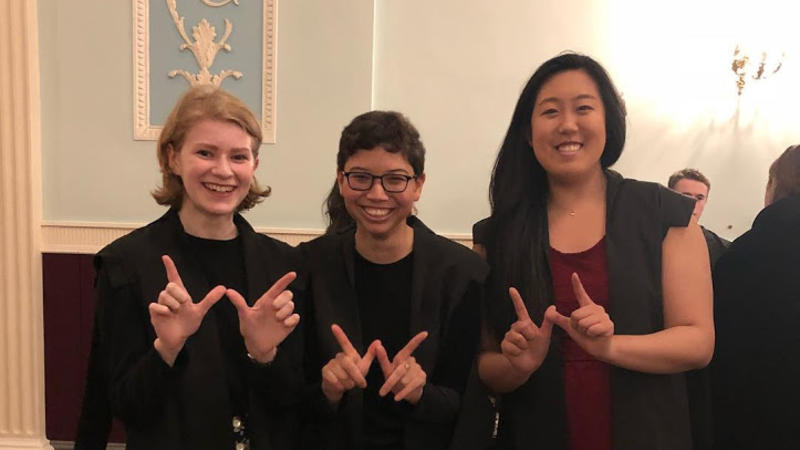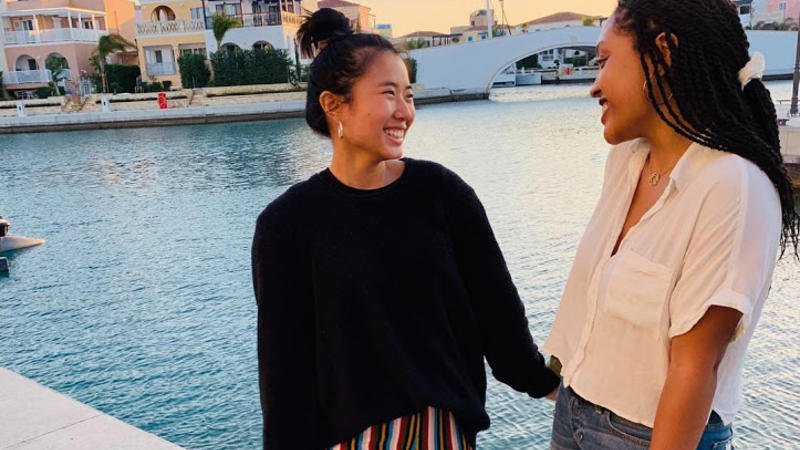Identity Abroad
Identity Abroad
What you will encounter abroad may not always be the same welcoming community that Wellesley offers. Different cultures are going to have different levels of sensitivity, but that does not mean you need to change anything about yourself to go abroad. Students who are a minority student in their host country sometimes receive additional attention, which may or may not be discrimination. You can talk with your host family and program to discuss issues that may arise while you are abroad and brainstorm solutions that both respect the host culture and your own identity. The following tips and resources may also help you prepare for your time abroad.
Please note that all Wellesley students have access to the member-only resources on DiversityAbroad.org! Log-in information can be found here (log-in required).
Please contact OIS if you have questions about accessing these resources:
What types of laws are in place? What is the political climate? Learn as much as you can about the culture, religion, living and health conditions before you go so you know more of what to expect.
- BeGlobalii - Culture & Diversity Travel Guides (country-specific)
- CIEE - City-Specific Diversity Resources for Studying Abroad
-
CET Academic Programs - Identity Abroad Resources by Location
- This spreadsheet shows reviews by Wellesley students over the last 8 years that highlight diversity and LGBTQ+ standards abroad.
African-American/Black Students:
-
Study Abroad Guide for Wellesley Students of African Descent
-
Travel Noire: travel tools, resources, and stories from black travelers
-
University of Wisconsin - Madison: Study abroad resources for Black students
-
IES Abroad - Being Me Abroad - Traveling with Natural Hair video playlist
-
Go Abroad - Traveling While Black: 9 Truths for Black Students Studying Abroad
Latinx Students:
-
IES Abroad - The Truth Revealed: 9 Misconceptions about Latinx Students & Study Abroad Debunked
-
University of Wisconsin - Madison: Study abroad resources for Latinx students
-
Latinas Who Travel - travel community for the Latinx diaspora
-
Go Abroad - “Te Vas?!” 7 Tips for Latinos Traveling on Programs Abroad
-
IES Abroad - Being Me Abroad - Traveling with Natural Hair video playlist
-
Diversity Abroad - Tips for Heritage Seekers Traveling Abroad
Asian/Asian-American Students:
-
University of Wisconsin - Madison: Study abroad resources for Asian students
-
CET Blog - On Belonging: Studying Abroad in Asia as an Asian American/Heritage Learner
Indigenous/Native American Students:
The prospect of studying abroad can be exiciting and overwhelming, especially if you're the first member of your family to do so. Not sure where to start? Talk to OIS or upperclass students. We'll walk you through the process and speak to amy concerns you may have.
"I discovered that my family background, which I always considered a barrier, actually had provided me with impressive intercultural competencies. I could already communicate across social class lines and understood the transition from immigrant to American. Why not take that knowledge across borders? What was perceived to be a deficit became a great benefit."
- Karen Collias, founder of Knowledge WIthout Borders
Resources
-
Knowledge Without Borders: Global Travel Benefits for First Gen Students
-
I'm First: blogs from first-gens about their study abroad experiences
-
University of California Santa Cruz advice for first-gen students
-
University of Wisconsin - Madison - First Generation Students Abroad
-
GoAbroad ebook - The First Generation Students Study Abroad Guide
Understanding of sexual orientation, gender identity, and gender expression may differ depending on where in the world you are traveling. Going abroad can thus present the opportunity to think about LGBTIA+ identity in a whole new way. Before going abroad, determine your own individual needs and request information on how these can be met. Ask yourself:
-
How important is it to me to go somewhere accepting of my identity?
-
What does LGBT+ expression look like in my destination? How does this differ from what I'm used to?
-
What are the social attitudes towards being LGBT+ in my destination?
-
How inclusive of the “T” are local LGBT+ groups?
-
What resources are available in my host country or program?
-
Will I need access to any medications, supplies, or services while abroad?
Gender Markers and Official Documentation:
Since 2021, the U.S. Department of State has allowed individuals to select male (M), female (F), or unspecified (X) as their gender marker on passport applications. This marker does not need to match that on your supporting documentation. Though the State Department will issue a passport with an X gender marker, this does not guarantee you entry into other countries. Some destinations may not recognize the X gender marker. Before traveling, it is imperative that you check with the foreign embassy or consulate of the destination country in the United States.
International students will need to consult their embassy or consulate to determine if an X gender marker is available to them.
Trans and Gender Non-Confirming:
-
Brandeis University - Transgender and Non-Binary Students Abroad
-
IES Abroad - Air Travel Tips for Transgender Students Studying Abroad
-
USAC Blog: Breaking The Picture Frame - Studying Abroad While Trans
Resources:
-
GoAbroad - Meaningful Travel Tips and Tales for LGBTQ+ individuals
-
GoOverseas Blog - 9 Major Life Lessons I Learned Studying Abroad as an LGBT
-
GlobalGayz - online journal documenting the travels of LGBT individuals around the world
-
IES Abroad Blog: Queer life in the first country to legalize same-sex marriage
Studying abroad with a disability is absolutely possible, and we will work closely with you to identify program options and accommodations best suited to your needs. You may also consult with Wellesley’s Accessibility and Disability Resources office (accessibility@wellesley.edu).
-
Mobility International USA - Accessibility guidance for traveling abroad
-
National Clearinghouse on Disability and Exchange (NCDE) - Web Resource Library
-
Studee - Ultimate Guide to Studying Abroad with a Disability
-
US State Department - Considerations for Travelers with Disabilities
Wellesley Resources:
-
Transcript of Recent OIS Studying Abroad with a Disability Panel
-
Accessibility of Study Abroad Programs (created by Student Ambassador Lidewij Florusbosch '24)
-
Contact Information for Accessibility of Study Abroad Programs
-
Advice & Guidance on Studying Abroad with a Disability (blog post written by Lidewij Florusbosch '24 for the Student Access Advocates)
Take a look at the resources below for tips when it comes to financing your time abroad. OIS staff are also available to speak with you at any time about study abraod scholarship opportunities. Contact Katie Saibara for more information.
-
Islamic Finder: prayer times, Islamic organizations, and mosques worldwide
-
All Hindu Temples: Hindu temples in more than 50 countries
-
International churches: churches worldwide
-
World Buddhist Directory: Buddhist centers worldwide
-
KAHAL - Your Jewish Home Abroad: resources for students looking to be connected with Jewish communities around the world
Physical Health
-
CDC - Make sure to know what vaccinations are recommended or required in your destination
-
IES Blog - Student Advice: How to Maintain Your Health While Studying Abroad
Mental Health
-
Wellesley College Active Minds - Mental Health and Wellness Studying Abroad
-
MIUSA - Successful Study Abroad with a Mental Health Condition
-
IFSA Student Blog - Wherever You Go, There You Are: Mental Health Issues Abroad
Diet
- 3 Steps to Take Before You Talk to Your Parents About Studying Abroad
- TEAN's Student Identity and Support page
- Diversity Abroad - Women Going Abroad
- Go Oversea's guide for studying abroad as a College Athlete
- IES Abroad's Social Identity Resources



